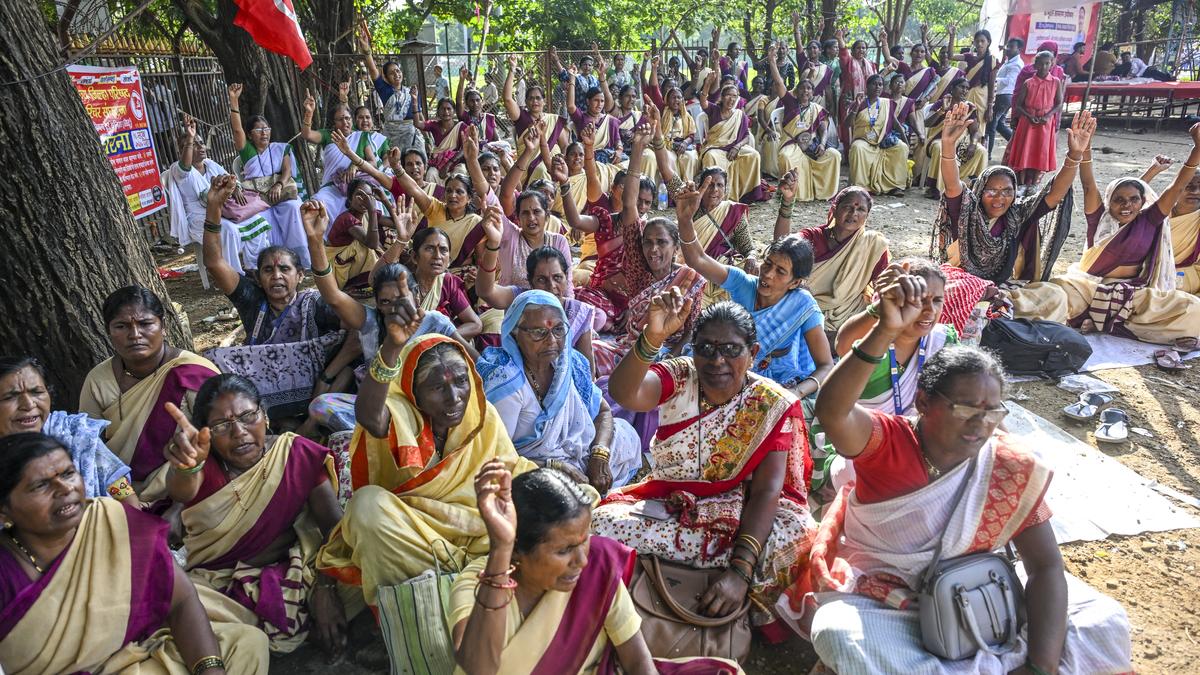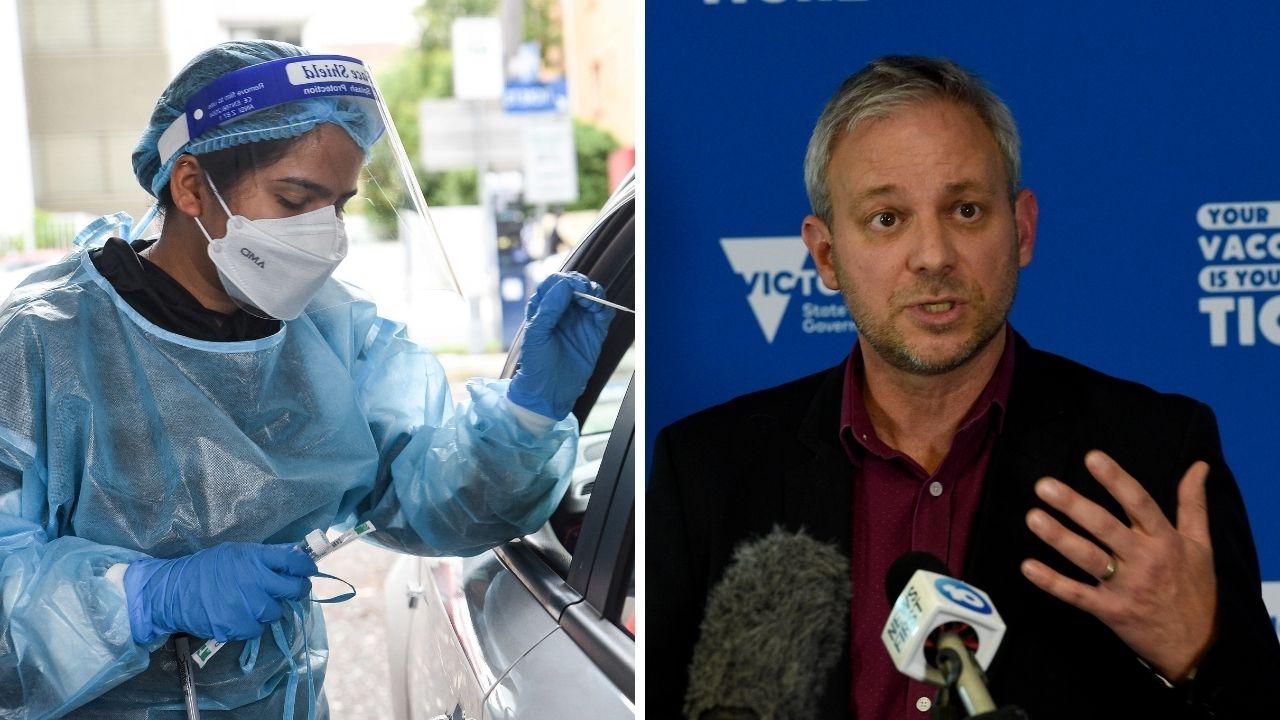We deliver babies, clean health-care centres, in just ₹3,000 per month: Maharashtra’s part-time women attendants demand justice
By Purnima Sah
Copyright thehindu

Braving the rains and the late September heat, hundreds of Anshakalin Stree Parichars, part-time women health-care attendants, from across Maharashtra have been staging an indefinite sit-in at Mumbai’s Azad Maidan since September 16, 2025.
Every day, slogans echo across the ground, “Awaz do, hum ek hain!… Phool nahi chingari hain, hum Bharat ki naari hain!… Aage ki bai halla bol, piche ki bai halla bol, prashashan pe halla bol…” “Yet, despite their persistent voices, no Minister has come to meet them so far,” said Mangala Arun Meshram (55) the State president of the Mahila Parichar union who has come from Adam village in Kuhi taluka of Nagpur district.
There are 10,673 such attendants across Maharashtra who work closely with Auxiliary Nurse Midwife (ANM) in sub-centres and primary health centres (PHCs) in rural areas. A minimum qualification of till Class VII is required to get this job and they learn all kinds of medical work at the health-care units.
The Anshakalin Stree Parichar category was created in 1966 by Maharashtra’s Zilla Parishads. Although described as “part-time,” these women work full-time hours, 8 a.m. to 5 p.m. and sometimes overnight, handling a wide range of responsibilities in sub-health centres and primary health centres (PHC).
Their work includes assisting childbirths (often independently), conducting vaccination drives, door-to-door health surveys, patient care, helping in surgeries, regular check-ups such as blood-pressure, sanitation duties, sweeping, mopping, cutting grass in hospital compounds, and even COVID-19-related tasks such as RT-PCR testing and vaccination drives. They are even deployed at the government run ayurvedic, allopathic and homeopathic dispensaries. Ms. Meshram said there are 700 such government-run dispensaries across the State where her colleagues work.
In an orange colour file, Ms. Meshram has preserved proof of their work in the form of coloured photographs clicked on mobile phones along with a description of their work. “We prepared these to present it to the Ministers for whom we are invisible. From the sub-centre, we are sent to multiple locations such as PHCs or the dispensaries or to handle a childbirth. To reach these locations, we walk for hours as we don’t get any travel allowance either and in this meagre pay, we cannot afford,” she said.
They work from Mondays to Saturdays and in case of emergency such as childbirth or any health camp, they have to work without any pay. They don’t have any holiday, and they cannot take sick leave either.
Despite such demanding work, they are paid only ₹3,000 per month, a wage unchanged since 2016. They have no pension, provident fund, travel allowance, health insurance, or job security. Many, especially widows and abandoned women, have been in service for decades, hoping for permanent status that has never come.
“We do deliveries on our own, but the credit and incentives go to ASHA and ANMs. We are told, ‘don’t you already get a salary?’” said one attendant who has come from Sangli.
Sixty-year-old Narmada Bai Gavai from Kajikhed village, Balapur taluka in Akola district, started working as an attendant at 22. She was very excited initially as getting a government job is a big deal. Back then, my pay was just ₹50 and, in that amount, I have delivered babies, extracting placenta from uterus, cutting the umbilical cord, cleaning the baby, doing laundry, mopping, and every kind of work. Our entire lives have gone waiting for a pay raise. The ₹3,000 doesn’t even last two weeks.”
Sulochana Mamurkar (48) from Khursipar village in Saoner tehsil of Nagpur district, recalled working for free for 11 months before getting ₹500 a month. “27 years ago, running a house in just ₹500, for the amount of work, was nothing like a slavery. Slowly the money increased ₹1,100 and, in that money, I have raised two daughters. But enough of this exploitation. Even when we were coming to stage protest, we were threatened by the doctors and the medical staff at PHCs and sub-centres that they will throw us out of job if we do not get back to work,” she said.
The women narrated harrowing incidents of colleagues dying on duty, one in a road accident while traveling for COVID-19 duty, another from a snake bite while cutting grass in a PHC, and others while travelling long distances to assigned centres during vaccination drive.
Ms. Meshram said, “One of our colleagues, Durga Gomkare from her Kelwad village in Nagpur who was on her way to the protest site in Mumbai, had an accident and suffered severe head injury and passed away.”
Timeline of stagnant wages: From 1966–1985 the pay was ₹20 per month; 1986–1987 it was ₹50; from 1988 to 1995 it was raised to ₹80; in 1995 State gave ₹400 and Centre ₹450; in 2000 the State gave ₹500 and Centre gave ₹100; in 2008 State increased the pay to ₹800 and Centre was still giving ₹100; in 2010 State increased the pay to ₹1,100 and Centre stopped paying; from 2016 till present, State has been paying ₹2,900 and Centre gives ₹100.
The women attendants are demanding at least ₹26,000 per month and official recognition as Multipurpose Health Workers and not part-time attendants.
In 2020, a case was filed under the Minimum Wages Act at the Labour Court in Nagpur, seeking ₹6,000 per month. In February 2023, the court acknowledged their exploitation, stating they deserved wages at least comparable to the Minimum Wages Act, but left the final decision to the government.
Repeated meetings with Health Ministers and officials have led only to promises. “On July 17, 2025, the Health Minister said he would prepare a proposal. On August 12, he repeated the assurance. But nothing has reached the Cabinet yet. On follow-ups, he keeps saying that it will do,” said Ms. Meshram.
State Public Health and Family Welfare Minister, Prakash Abitkar said, “They need not protest when we are discussing the matter and positive steps will be taken to address their prolonged demands. We cannot disclose any details regarding their pay scale hike and whether to make them permanent staff at this stage.”
The protesting women said they sleep at railway platforms at night and get ready there itself, returning to Azad Maidan the next morning, to raise slogans. “It has been difficult, we are struggling with money and have left our children home to come here. Just now we had lunch spending ₹70 which is very expensive for us to afford. Despite all this, we will not leave until our demands are met because we have had enough of exploitation,” said Ms. Mamurkar.
“Anshakalin Stree Parichars predate even ASHAs and Anganwadi workers. They are the backbone of Maharashtra’s public health system, yet the most neglected. The government has neglected their existence and exploited them for years because these are rural, underprivileged women who never knew about their rights,” said Shalik Maulikar, vice-president of the All India State Pensioners’ Federation.



